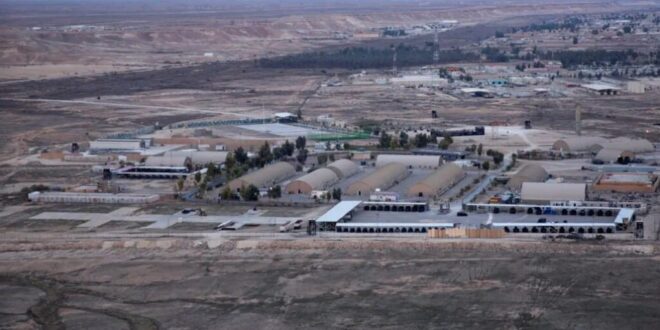Two drones targeted the Ain al-Asad Airbase in Iraq on July 16, a military outpost that hosts American and coalition forces. The drone strikes mark the second attack on American forces in Iraq since early February when the Islamic Republic’s Iraqi proxies temporarily halted their attacks on American forces.
An Iraqi military official told Reuters that the international coalition’s air-defense systems shot down one of the two drones near the Ain al-Asad perimeter. The official added that patrols in the areas surrounding the base have increased as a response. A US official stated that a projectile appeared to have targeted the base but did not cause any casualties.
Islamic Republic state media promptly credited Iran-backed Iraqi militias with the attack. Mehr News, an outlet closely affiliated with the Islamic Revolutionary Guard Corps (IRGC), claimed on July 16 that “Islamic Resistance in Iraq launched a drone attack on the US Ain al-Assad base.” The report also highlighted that Tehran-backed Iraqi militias have resumed their attacks on US bases following months of relative calm.
The Islamic Republic has sought to “expel the US from Iraq” in response to the US striking former IRGC Quds Force Commander Brigadier General Qassem Soleimani in 2020. In a meeting that year with former Iraqi Defense Minister Juma Inad, IRGC Commander Brigadier General Hossein Salami urged the Iraqi parliament to vote against US presence in Iraq. Shortly after, the Shia members of Iraq’s parliament endorsed a resolution to end the American military presence on Iraqi soil.
A few weeks prior to the July 16 attack, Iran-backed militias had threatened US bases in Iraq. In late June, Qais al-Khazali, the secretary general of Asaib Ahl al-Haq, warned in a televised speech that should Israel attack Lebanon, “let America know that it has made all its interests in the region and Iraq subject to targeting and danger.” Although tensions in Israel’s northern front have not escalated into a wider conflict, Tehran’s Iraqi proxies are perhaps nonetheless seeking to pressure the US.
The attack comes amid the backdrop of Iraqi Shia militants giving Prime Minister Mohammad Shia’ Al-Sudani a 40-day deadline on June 5 to resolve the issue of expelling US forces from the country. The groups demanded a publicly announced timeline and threatened to resume their attacks against American targets and interests in Iraq and the region should the issue of a US presence in Iraq not be resolved within the proposed timeframe.
The latest attack on US troops could be attributed to the internal fissures within the Iraqi decision-making circle. Reports suggest that divisions have emerged in the Shia Coordination Framework. These disagreements involve multiple groups within the framework, Prime Minister Al-Sudani, and the Iraqi Islamic Resistance factions. The primary issue is the postponement of the Iraq-US negotiations regarding the end of the international coalition’s mission and the withdrawal of American forces from Iraq.
Some Iraqi Islamic Resistance factions have stated that efforts surrounding the Iraqi-American negotiations are futile and unlikely to yield prominent results. They believe that these talks are paving the way to replace the international coalition’s presence with a US presence per a potential bilateral security agreement.
In this context, a high-ranking Iraqi delegation is set to visit Washington, DC, in the upcoming weeks to discuss the details of a possible bilateral deal. Such an arrangement is unacceptable to various factions, the hardline camp, and, most importantly, their patron, the regime in Tehran.
 Eurasia Press & News
Eurasia Press & News



